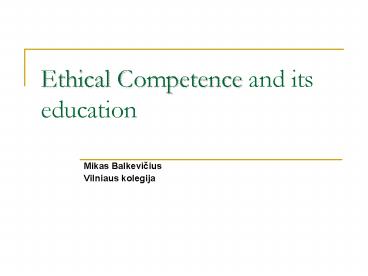Ethical Competence and its education
1 / 26
Title:
Ethical Competence and its education
Description:
LT Education and Training system. Teaching ethics in general school ... consider individual human self-existence, decide and act responsibly in today's complex world. ... –
Number of Views:46
Avg rating:3.0/5.0
Title: Ethical Competence and its education
1
Ethical Competence and its education
- Mikas Balkevicius
- Vilniaus kolegija
2
NQF
3
Learning outcomes structure
4
Learning outcomes and Key Competences
5
Social and civic competences
- These include personal, interpersonal and
- intercultural competence and cover all forms
- of behavior that equip individuals to participate
- in an effective and constructive way
- in social and working life, and particularly in
- increasingly diverse societies, and to resolve
- conflict where necessary. Civic competence
- equips individuals to fully participate in civic
- life, based on knowledge of social and political
- concepts and structures and a commitment
- to active and democratic participation.
6
Social and civic competences
- knowledge of how... successful interpersonal and
social participation, it is essential to
understand the codes of conduct and manners
generally accepted in different societies and
environments (e.g. at work, gender equality and
non-discrimination, society and culture) - skills of this competence include the ability to
communicate constructively in different
environments, to show tolerance, express and
understand different viewpoints, to negotiate
with the ability to create confidence, and to
feel empathy - attitude of collaboration, assertiveness and
integrity. Individuals should have an interest in
socio-economic developments and intercultural
communication and should value diversity and
respect others, and be prepared both to overcome
prejudices and to compromise.
7
Ethical Competence
8
(No Transcript)
9
Project background
10
Project background
11
Project background
12
Project background
- Secondly, we believe that one specific way to
reintroduce ethics into the EQF is by fostering
greater dialogue between the higher education
literature and the literature on the teaching of
ethics. Such a dialogue is sorely missing in the
development of the EQF to date and could help
overcome the amorality in which the framework has
issued. - Thirdly, it seems vital to study ways of ensuring
that ethics appears explicitly at all levels of
the EQF. This will require a revision of the grid
proposed by the European Commission. - Fourthly, it would be highly advisable to develop
indicators for describing and evaluating moral
competences, so that ethics can be more readily
included in the higher education framework
(Counelis, 1993). - Lastly, the work currently under way to develop
study programs in line with the EQF should
continue, but paying particular attention to
whether the ethical perspective is included not
only as a subject of study but in the content and
approach of all subjects.
13
LT Education and Training system
14
(No Transcript)
15
Teaching ethics in general school
- Since 5th form pupils or parents have a right to
choose what educational subject to choose
religion or ethical education
16
Aspects of moral education in school
- General ethics program is aimed at the ethical
issues to consider three aspects - Philosophical
- Psychological
- Practical
17
Moral education purpose Lithuanian general
education schools and the general program of
general education standards. XI - XII class
- Moral education aims to help students reveal
common human values and are based on personal and
social life. School educated person's ability
should consider individual human self-existence,
decide and act responsibly in today's complex
world. At the same time promote individual
respect for traditional native foreign countrys
values.
18
Didactical approaches in Moral education
- In order to make students consciously chosen
principles and life orientation, greater emphasis
on reflection. Not only the personal experience
is being taken into account but also different
primary source of ideas - the textbooks
(philosophers, psychologists excerpts of original
texts, literary works, textbooks thoughts), the
Holy Scripture, the interpreter works, art
reproduction, film (documentary, artistic) works,
interviewing, discussion, problematic
discussions.
19
Moral education in Vocational training and Higher
education system
20
Humanistic approach in teaching and learning
ethics
LawPolitics Management and Administration
Business Sociology Education
- Humanitarian sciences
- Social sciences
- Biomedical sciences
- Physical sciences
- Technological sciences
21
Ethical Competence
- Ability to follow common ethical standards and
norms
Knowledge
Skills
Attitudes
22
Treaty establishing a Constitution for Europe
- Common values of the Union's member states
- As stated in Articles I-1 and I-2, the Union is
open to all European States that respect the
member states' common values, namely - human dignity
- freedom
- democracy
- equality
- the rule of law
- respect for human rights
- minority rights
- free market
- Member states also declare that the following
principles prevail in their society - pluralism
- non-discrimination
- tolerance
- justice
- solidarity
- equality of the sexes
23
Project proposal for formal, non-formal
educational institutions Ethics matrix
24
Didactical approach in teaching ethics
25
The main components of ethical education
- Educational content - ?
- Educational methods - ?
- Pedagogical issues - ?
- Learning outcome evaluation - ?.
26
- "Act only according to that maxim whereby you can
at the same time will that it should become a
universal law






























